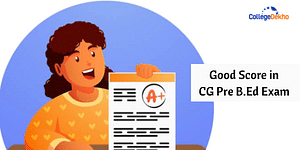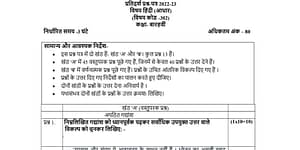B.Ed in Commerce Semester-Wise Syllabus and Subjects
Table of Contents
- B.Ed in Commerce Syllabus and Subjects Overview
- B.Ed in Commerce Syllabus and Subjects Year-Wise
- B.Ed in Commerce Subjects
- B.Ed in Commerce Course Common Subjects Semester-Wise
- B.Ed in Commerce Syllabus Course Structure
- B.Ed in Commerce Course Practicals
- Specializations Offered in B.Ed in Commerce Specializations Offered in B.Ed in Commerce
- B.Ed in Commerce Entrance Exam Syllabus
- B.Ed in Commerce Syllabus Important Books
- FAQs about B.Ed in Commerce Syllabus
B.Ed in Commerce Syllabus and Subjects Overview
B.Ed in Commerce is crafted to impart a robust comprehension of commerce disciplines and teaching methodologies. Its syllabus spans various subjects crucial for commerce educators.
Throughout the B.Ed in Commerce degree, you’ll delve into subjects such as Principles of Accounting, Business Studies, Economics, Financial Management, and Educational Psychology. These courses form a solid base in commerce-related principles and theories.
Principles of Accounting covers fundamental financial record-keeping and reporting. Business Studies explores diverse aspects of business, encompassing management principles and marketing. Economics enhances your understanding of macroeconomics and microeconomics, while Financial Management focuses on financial decision-making and planning. Educational Psychology, a vital subject, aids in comprehending human behavior and learning, facilitating the creation of effective teaching strategies.
Alongside these subjects, practical experience is integrated through internships or teaching practice in your B.Ed in Commerce journey. This hands-on exposure enables you to apply your knowledge in authentic teaching scenarios.
In essence, the B.Ed in Commerce program is tailored to furnish you with the essential knowledge and skills for a successful career as a commerce educator. This engaging pathway combines commerce subjects with educational pedagogy, preparing you for a gratifying teaching career in commerce.
B.Ed in Commerce Syllabus and Subjects Year-Wise
The year-wise and semester-wise B.Ed in Commerce syllabus is given in the table below:
| Year 1 | Semester 1 | - Introduction to Business Studies - Microeconomics - Financial Management - Business Ethics and Corporate Governance - Principles of Accounting - Educational Psychology |
|---|---|---|
| Semester 2 | - Financial Accounting - Business Management - Macroeconomics - Business Law - Entrepreneurship Development - Pedagogy and Teaching Methods | |
| Year 2 | Semester 3 | - Cost Accounting - Banking and Insurance - Marketing Management - Indian Economy - Educational Technology - Specialization Elective 1 |
| Semester 4 | - Corporate Accounting - Human Resource Management - International Economics - Assessment and Evaluation in Education - Specialization Elective 2 - Internship/ Teaching Practice |
The specialization electives in the second year can vary depending on the university or college offering the degree. Some common specializations include Taxation, Auditing, E-commerce, and Financial Services.
Throughout the B.Ed in Commerce course, students will also have practical teaching experiences through internships or teaching practice, which will provide hands-on learning opportunities.
Also Read: List of Commerce Subjects in B.Ed Commerce
B.Ed in Commerce Subjects
Here are some of the subjects typically covered in a B.Ed in Commerce degree:
- Principles of Accounting
- Business Studies
- Economics
- Financial Management
- Marketing Management
- Cost Accounting
- Human Resource Management
- International Economics
- Banking and Insurance
- Business Law
- Entrepreneurship Development
- Educational Psychology
- Pedagogy and Teaching Methods
- Assessment and Evaluation in Education
- Educational Technology
These subjects provide a comprehensive understanding of commerce-related concepts, teaching methodologies, and practical skills necessary for a career in commerce education.
1. Principles of Accounting: This subject focuses on the fundamental principles and concepts of accounting, including financial record-keeping, reporting, and analysis.
2. Business Studies: The subject of Business Studies explores various aspects of business, such as management principles, organizational behaviour, marketing strategies, and business ethics.
3. Economics: Economics studies the production, distribution, and consumption of goods and services. It covers both microeconomics (individual economic behavior) and macroeconomics (economy as a whole).
4. Financial Management: Financial Management deals with financial decision-making, planning, and analysis. It includes topics like budgeting, capital investment, financial risk management, and financial statement analysis.
5. Marketing Management: Marketing Management focuses on the principles and strategies of marketing, including market research, product development, pricing, promotion, and distribution.
6. Cost Accounting: Cost Accounting involves the measurement, analysis, and control of costs in business operations. It helps in determining the cost of products or services and aids in decision-making.
7. Human Resource Management: Human Resource Management deals with managing and developing the human capital within an organization. It covers areas like recruitment, training, performance evaluation, and employee relations.
8. International Economics: International Economics explores the economic interactions between countries, including international trade, foreign exchange rates, global economic policies, and economic integration.
9. Banking and Insurance: This subject covers the principles and practices of banking and insurance, including financial institutions, banking operations, insurance policies, and risk management.
10. Business Law: Business Law focuses on the legal aspects of business, including contracts, company law, intellectual property rights, consumer protection, and legal frameworks for business operations.
11. Entrepreneurship Development: Entrepreneurship Development emphasizes the skills and knowledge needed to start and manage a business successfully. It covers topics like business planning, innovation, financing, and entrepreneurial mindset.
12. Educational Psychology: Educational Psychology explores the psychological principles and theories related to learning, motivation, cognitive development, and classroom management.
13. Pedagogy and Teaching Methods: Pedagogy and Teaching Methods focus on effective teaching strategies, instructional design, classroom management techniques, and assessment methods.
14. Assessment and Evaluation in Education: This subject covers the principles and techniques of assessing and evaluating student learning, including different types of assessments, grading systems, and data analysis.
15. Educational Technology: Educational Technology explores the use of technology in education, including instructional design, e-learning platforms, multimedia tools, and educational software.
B.Ed in Commerce Course Common Subjects Semester-Wise
The core subjects for B.Ed in Commerce may vary depending on the specific university or institution offering the course. However, some common core subjects in B.Ed in Commerce may include:
1. Principles of Accounting
2. Business Studies
3. Economics
4. Financial Management
5. Marketing Management
6. Cost Accounting
7. Human Resource Management
8. Business Law
9. Entrepreneurship Development
10. Educational Psychology
11. Pedagogy and Teaching Methods
12. Assessment and Evaluation in Education
13. Educational Technology
Here are some elective subjects that are commonly offered in B.Ed in Commerce programs:
1. Financial Accounting
2. Taxation
3. International Business
4. Organizational Behavior
5. Business Ethics
6. Retail Management
7. E-Commerce
8. Corporate Finance
9. Investment Analysis
10. Strategic Management
These elective subjects allow students to specialize in specific areas of commerce based on their interests and career goals.
Also Read: B.Ed after B.Com- Details
B.Ed in Commerce Syllabus Course Structure
The typical B.Ed in Commerce program consists of a blend of core and elective subjects, practical sessions, and teaching internships, spanning a duration of 2 years. It's worth noting that the specific course structure might vary among different universities or institutions providing the program.
B.Ed in Commerce Course Practicals
In a B.Ed in Commerce course, practical components are often included to provide hands-on experience and practical skills development. These practical components can vary depending on the specific subjects and university requirements. Some common practical activities in B.Ed in Commerce may include:
1. Classroom teaching practice: Students may have the opportunity to observe and participate in actual classroom teaching, where they can apply teaching methodologies and strategies learned in their coursework.
2. Lesson planning and implementation: Students may be required to design lesson plans and deliver them in a classroom setting, allowing them to practice their teaching skills and assess student learning outcomes.
3. Educational technology integration: Practical sessions may involve using educational technology tools and resources to enhance teaching and learning experiences, such as creating multimedia presentations or utilizing online learning platforms.
4. Field visits and internships: Students may have the chance to visit educational institutions, businesses, or organizations related to commerce, gaining exposure to real-world scenarios and industry practices.
5. Assessment and evaluation: Practical sessions may involve designing and administering assessments, grading student work, and analyzing assessment data to inform instructional decisions.
These practical components aim to bridge the gap between theory and practice, preparing B.Ed in Commerce students for their future careers in commerce education.
Specializations Offered in B.Ed in Commerce Specializations Offered in B.Ed in Commerce
Specializations aren't commonly provided in B.Ed in Commerce programs, as the emphasis is on imparting a comprehensive grasp of both commerce and education. Nonetheless, students can opt for elective subjects aligned with their interests to specialize in particular areas within commerce, like finance, marketing, or entrepreneurship. This enables students to cultivate a more profound understanding of their chosen area while successfully completing the B.Ed in Commerce program.
B.Ed in Commerce Entrance Exam Syllabus
In the B.Ed in Commerce entrance exam syllabus, common topics that are typically included are:
1. General Knowledge: Current affairs, national and international events, sports, awards, and honors.
2. English Language: Grammar, vocabulary, comprehension passages, sentence formation, and error detection.
3. Quantitative Aptitude: Basic arithmetic, numerical ability, data interpretation, and problem-solving.
4. Reasoning Ability: Logical reasoning, analytical ability, series completion, and pattern recognition.
5. Teaching Aptitude: Principles and methods of teaching, educational psychology, classroom management, and assessment techniques.
These are some of the common topics that are often covered in B.Ed in Commerce entrance exams.
B.Ed in Commerce Syllabus Important Books
Some important books for B.Ed in Commerce syllabus preparation may include:
1. "Teaching Aptitude and Attitude" by S. Chand
2. "General Knowledge 2023" by Arihant Experts
3. "Quantitative Aptitude for Competitive Examinations" by R.S. Aggarwal
4. "English Grammar in Use" by Raymond Murphy
5. "Logical and Analytical Reasoning" by A.K. Gupta
These are just a few examples of books that can be helpful for B.Ed in Commerce preparation. It is important to note that the specific books you choose may depend on your learning style and preferences. It is always a good idea to consult with teachers, seniors, or coaching institutes for further guidance on recommended books for B.Ed in Commerce syllabus preparation for entrance exams.
FAQs about B.Ed in Commerce Syllabus
Describe a concise outline of the B.Ed in Commerce curriculum?
The B.Ed in Commerce course structure commonly encompasses core subjects like Commerce, Educational Psychology, Pedagogy, Teaching Methodologies, and Electives, along with teaching internships for practical classroom experience.
Are there particular elective courses within the B.Ed in Commerce program?
Certainly, certain institutions offering B.Ed in Commerce may present elective choices like Financial Management, Human Resource Management, International Business, E-commerce, and Taxation.
What are the common subjects included in the B.Ed in Commerce syllabus?
The common subjects in the B.Ed in Commerce syllabus include Principles of Management, Business Communication, Financial Accounting, Marketing Management, Economics, Business Law, and Entrepreneurship.
Are there any practical sessions in the B.Ed in Commerce course?
Certainly, the B.Ed in Commerce program includes hands-on sessions incorporating case studies, group discussions, presentations, and practical activities associated with both commerce and instructional approaches.
What is the duration of the B.Ed in Commerce program?
The B.Ed in Commerce program spans for 2 years divided into four semesters.
What are the career opportunities for B.Ed in Commerce course graduates?
The B.Ed in Commerce course graduates career opportunities include Teachers, Content Writers, and Principal. Counselors, Translators, Creative Writer, Curriculum Developer etc.
Is B.Ed in Commerce in distance mode valid?
Yes, distance B.Ed in Commerce courses are valid in India.
What is the syllabus for B.Ed in Commerce entrance exams?
The syllabus for B.Ed in Commerce entrance exam is as follows:
- Broad knowledge encompassing current events, both domestic and global, sports, accolades, and recognitions.
- Proficiency in English involving grammar, vocabulary, understanding passages, constructing sentences, and identifying errors.
- Numerical skills covering fundamental arithmetic, numerical proficiency, interpreting data, and solving problems.
- Cognitive skills such as logical reasoning, analytical thinking, completing series, and recognizing patterns.
- Competence in teaching, including understanding principles and methods, educational psychology, managing classrooms, and employing assessment techniques.
Is a B.Ed in Commerce course difficult?
No, a B.Ed in Commerce course is not difficult as such, an individual with hard work and consistent practice can complete the course with ease.
Are there any practical and internships to be completed in the B.Ed in Commerce program?
Yes, under the B.Ed in Commerce course, practical’s and internships are part of the curriculum and need to be mandatorily done to complete the course.
Popular Courses
- Courses
- B.Ed in Commerce
- Syllabus


















